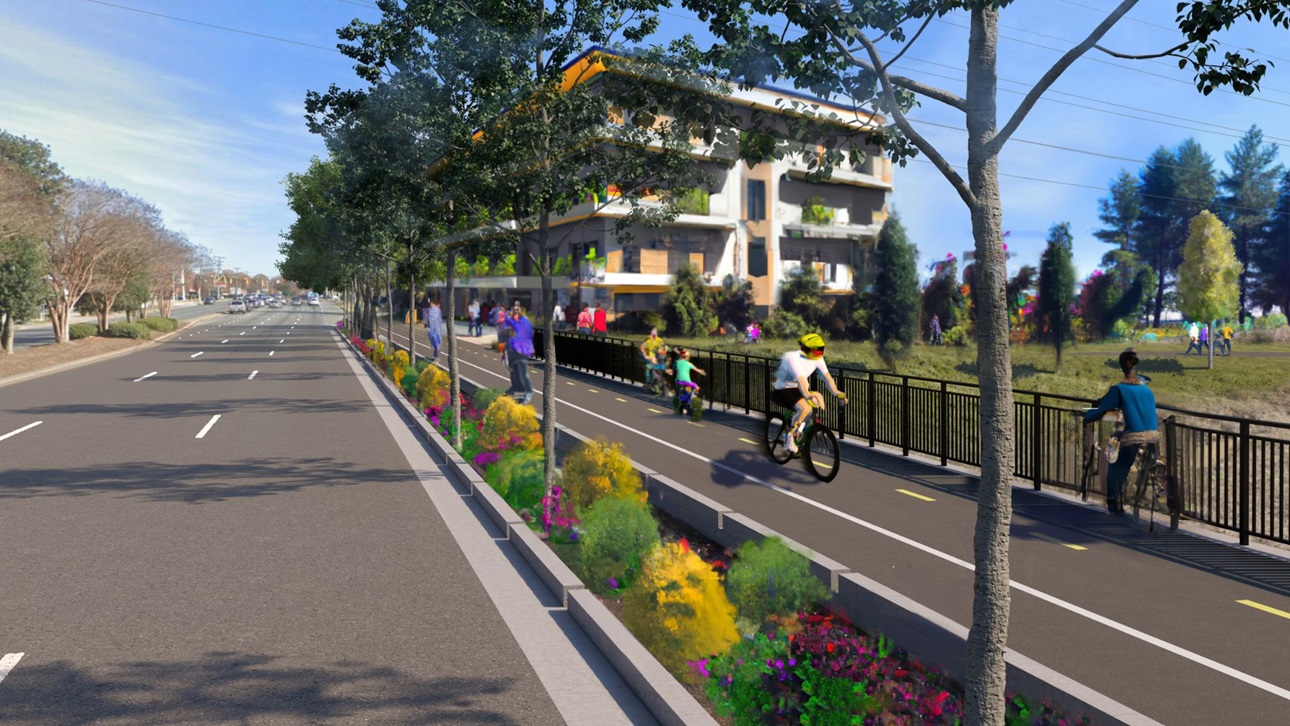Albemarle Road Cultural Trail

Technical Assistance Panel
Report Summary:
Albemarle Road Cultural Trail Technical Assistance Panel Report:
- ULI Charlotte partnered with the City of Charlotte to explore the development of a cultural trail in the Albemarle Road Corridor.
- The goal was to create a multi-modal transportation option while celebrating the neighborhood's cultural diversity.
Recommendations:
- Focus on equity: Ensure accessibility and inclusivity for all residents to improve quality of life and economic mobility.
- Promote health: Make healthy choices easier by incorporating health promotion and education along the trail. Address safety concerns and prioritize the well-being of all residents.
- Drive economic development: Attract employers, spark commercial development, and assist residents in accessing career opportunities. Invest in the trail infrastructure to break the cycle of disinvestment.
- Engage the community: Conduct robust and continuous community engagement with diverse representation to ensure informed decision-making and trust.
Trail Options:
- The Spine + Fingers: A dedicated path separated from traffic, offering the most ideal experience for all users.
- The Loop + Fingers: Utilizes existing natural corridors and connects key destinations like schools and the YMCA.
- Urban Retrofit: Improves existing infrastructure with shared-use paths, requiring partnerships with landowners.
Other Considerations:
- Micro-mobility: Supplement the trail with flexible transportation options like bike rentals and micro transit.
- Active programming: Organize events, festivals, and activities to make the trail vibrant and attractive.
Conclusion: The report outlines several options for developing a cultural trail in the Albemarle Road Corridor, emphasizing the importance of equity, health, economic development, and community engagement.
Report Summary: Albemarle Road Cultural Trail Technical Assistance Panel Report:
- ULI Charlotte partnered with the City of Charlotte to explore the development of a cultural trail in the Albemarle Road Corridor.
- The goal was to create a multi-modal transportation option while celebrating the neighborhood's cultural diversity.
Recommendations:
- Focus on equity: Ensure accessibility and inclusivity for all residents to improve quality of life and economic mobility.
- Promote health: Make healthy choices easier by incorporating health promotion and education along the trail. Address safety concerns and prioritize the well-being of all residents.
- Drive economic development: Attract employers, spark commercial development, and assist residents in accessing career opportunities. Invest in the trail infrastructure to break the cycle of disinvestment.
- Engage the community: Conduct robust and continuous community engagement with diverse representation to ensure informed decision-making and trust.
Trail Options:
- The Spine + Fingers: A dedicated path separated from traffic, offering the most ideal experience for all users.
- The Loop + Fingers: Utilizes existing natural corridors and connects key destinations like schools and the YMCA.
- Urban Retrofit: Improves existing infrastructure with shared-use paths, requiring partnerships with landowners.
Other Considerations:
- Micro-mobility: Supplement the trail with flexible transportation options like bike rentals and micro transit.
- Active programming: Organize events, festivals, and activities to make the trail vibrant and attractive.
Conclusion: The report outlines several options for developing a cultural trail in the Albemarle Road Corridor, emphasizing the importance of equity, health, economic development, and community engagement.
Panel Chair
Panelists
RELATED
Webinar
Tenant-Owner Partnerships for Net Zero in Asia-Pacific
Discover how owners and tenants in Asia Pacific are accelerating progress toward net zero. This webinar unpacks market signals (flight to quality, brown discounts), tenant engagement playbooks (data sharing, fit-outs, behavior), green leases, and rea...
Case Study
The Wilder
The Wilder, a motel-to-housing conversion, transformed a deteriorating 1970s motel into 97 studio apartments for households earning between 60% and 100% AMI.
Case Study
Sendero Verde
Sendero Verde is a transformative mixed-use development in East Harlem and one of the largest Passive House affordable residential projects in the world.
Topics
District & National Councils


